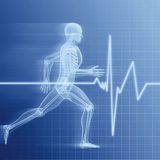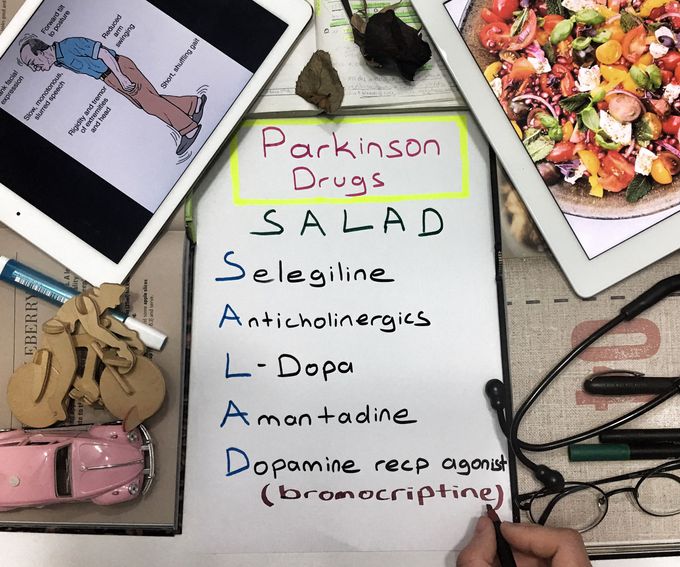


Parkinson Drugs Mnemonic
Parkinson's disease (PD) is a long-term degenerative disorder of the central nervous system that mainly affects the motor system. The symptoms generally come on slowly over time. Early in the disease, the most obvious are shaking, rigidity, slowness of movement, and difficulty with walking. Thinking and behavioral problems may also occur. Dementia becomes common in the advanced stages of the disease. Depression and anxiety are also common occurring in more than a third of people with PD. Other symptoms include sensory, sleep, and emotional problems. The main motor symptoms are collectively called "parkinsonism", or a "parkinsonian syndrome". The cause of Parkinson's disease is generally unknown, but believed to involve both genetic and environmental factors. Those with a family member affected are more likely to get the disease themselves. There is also an increased risk in people exposed to certain pesticides and among those who have had prior head injuries while there is a reduced risk in tobacco smokers and those who drink coffee or tea. The motor symptoms of the disease result from the death of cells in the substantia nigra, a region of the midbrain. This results in not enough dopamine in these areas. The reason for this cell death is poorly understood, but involves the build-up of proteins into Lewy bodies in the neurons. Diagnosis of typical cases is mainly based on symptoms, with tests such as neuroimaging being used to rule out other diseases. There is no cure for Parkinson's disease. Initial treatment is typically with the antiparkinson medication L-DOPA (levodopa), with dopamine agonists being used once levodopa becomes less effective. As the disease progresses and neurons continue to be lost, these medications become less effective while at the same time they produce a complication marked by involuntary writhing movements. Diet and some forms of rehabilitation have shown some effectiveness at improving symptoms. Surgery to place microelectrodes for deep brain stimulation has been used to reduce motor symptoms in severe cases where drugs are ineffective.
My grandma has Parkinson’s disease, she is about 75 years old it was detected 7 years ago. Right now it’s getting more difficult to live for her, because of stiff muscles she can’t even move. L-dopa and carbidopa medicines are given, but won"t give much relief. She can"t eat food and the skin is damaging forming ganglia. I thought this might be the last stage and the medications she was given did not help at all, so I started to do alot of research on natural treatments and came across Parkinson’s Herbal Treatment from Health Natural Centre In Hawaii ( healthnaturalcentre .org ), the treatment has made a very huge difference for her. Her symptoms including body weakness and her tremors disappeared after few months on the treatment. She is getting active again since starting this treatment, she is able to walk again ( down the street and back ) and able to ride her treadmill again. God Bless all PD Caregivers. Stay Strong, take small moments throughout the day to thank yourself, to love your self, and pray to whatever faith, star, spiritual force you believe in and ask for strength. I can personally vouch for these remedy but you would probably need to decide what works best for you.
I’m deeply grateful that my dad is no longer suffering. He battled Parkinson’s Disease and Coronary Artery Disease (CAD) for 8 years, during which we relied on Carbidopa-Levodopa, ACE Inhibitors, stem cell therapy, statins etc. While the medication helped initially, its effects wore off quickly, and his symptoms progressively worsened. Eventually, we were introduced to a treatment program from Earth Cure Herbal Clinic (ECHC), and the results have been life-changing. After completing the program, my dad’s symptoms significantly improved and ultimately disappeared. He’s now able to move freely, breathe properly with normal heart rate, he works now, and enjoys daily activities that were once impossible. I wholeheartedly recommend Earth Cure Herbal Clinic to anyone seeking alternative treatment options. You can learn more or contact them through their website: www.earthcureherbalclinic.com.
I’ve been living with Parkinson’s disease for quite some time, and for years, I struggled to find lasting relief. While medications offered some temporary help, the symptoms always returned and often worsened.Out of a mix of hope and hesitation, I decided to try an herbal treatment program from NaturePath Herbal Clinic. I’ll admit, I was skeptical at first. But around the fourth month, I began to notice real, steady progress.my tremors became less frequent the stiffness in my body eased My balance and coordination gradually improved It wasn’t an overnight transformation, but it was consistent and life changing. For the first time in years, I feel more in control of my body. I can move with greater freedom, sleep more peacefully, and enjoy daily activities without the constant discomfort I once accepted as normal.The improvement I’ve experienced physically, emotionally, and mentally has been nothing short of upliftings.If you're exploring natural options for managing Parkinson’s, I wholeheartedly recommend looking into NaturePath Herbal Clinic. Their approach has made a real difference in my life, and I’m truly grateful I gave it a chance. www.naturepathherbalclinic.com info@naturepathherbalclinic.com




